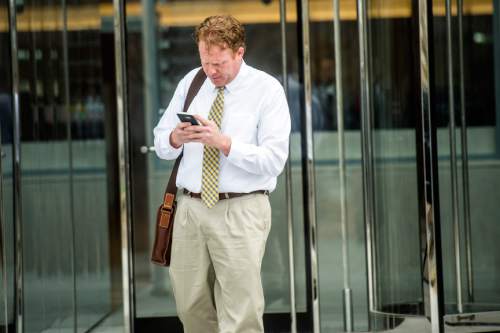This is an archived article that was published on sltrib.com in 2016, and information in the article may be outdated. It is provided only for personal research purposes and may not be reprinted.
A second defendant in the Jeremy Johnson criminal case is going to act as his own attorney.
A federal magistrate on Tuesday granted co-defendant Ryan Riddle's desire to become his own attorney at the trial that is set to begin Feb. 1 with jury selection. U.S. Magistrate Judge Paul Warner previously had granted Johnson's motion to represent himself, but appointed one of his current attorneys, Steven Killpack, as his legal adviser.
At a hearing called to discuss the request, Warner gave Riddle the same type of warning as he had given Johnson about the pitfalls of a defendant acting as his own attorney in a federal court criminal trial .
"You have the constitutional right to be stupid but you don't have to exercise that constitutional right," Warner said.
Riddle admitted he wasn't familiar with federal trial procedures and rules but still wanted to proceed as his own attorney.
"My wife and I have done a lot of prayer and fasting and the answer that has come is that this is best for us," Riddle said.
Johnson, Riddle and two other defendants are named in an 86-count indictment that centers on charges of bank fraud. Prosecutors allege Johnson and others set up a series of what they call "straw companies" and then used them to obtain bank accounts that would allow them to continue to charge consumer credit and debit cards after credit card issuers put I Works on a watch list because of a large number of chargebacks.
Johnson, now under a gag order, has said he and employees set up the companies under instructions from the bank or its agents in order to root out the sources of fraud from independent affiliate companies who contracted with I Works to sell products and that the bank or its agents were aware he was behind the companies.
In another development, Marcus Mumford, the attorney for co-defendant Scott Leavitt, asked the court to order Wells Fargo to turn over documents the defendants had subpoenaed for trial.
Wells Fargo, the bank which prosecutors allege was the victim of fraud, filed a motion to quash a subpoena seeking bank records related to Johnson, his I Works company and the accounts he held at the bank. Attorneys for the bank called Mumford's request as an "overbroad and needlessly burdensome subpoena demanding the collection, review and production of wide swaths of materials that go back as far as seven years."
In reply, Mumford said he is seeking records, in part, because they might shed light on one of Leavitt's defense theories, that the merchant accounts were not with the bank itself but with a related company, Wells Fargo Merchant Services LLC.
That company is not regulated by the Federal Deposit Insurance Corp. and, therefore, not covered by the bank fraud statues under which Johnson and the others are charged, Mumford said in his reply.



